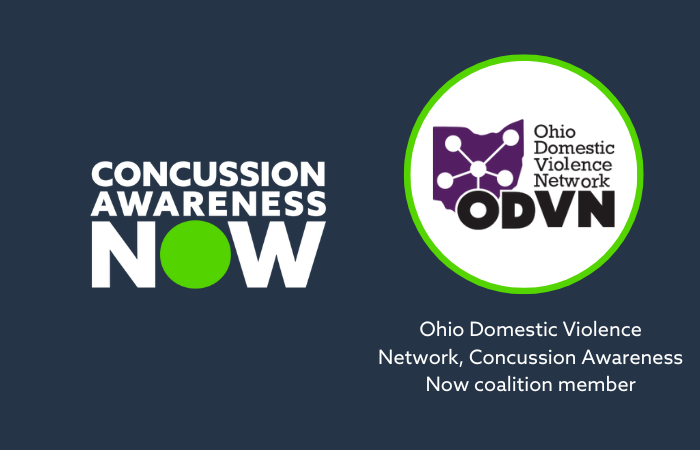By Rachel Ramirez, Director of Health and Disability Programs and Founder of The Center on Partner-Inflicted Brain Injury, Ohio Domestic Violence Network
It’s football season, and there is no doubt concussions will become a topic of discussion again. The 2022 National Football League (NFL) season brought changes to the NFL Concussion Protocol after several very public and very disturbing concussions witnessed by millions. While the Concussion Awareness Now coalition is working to educate the public on the multiple causes of concussion, to most average people, concussion is very much associated with sports. In fact, according to a survey conducted on behalf of Concussion Awareness Now, 84 percent of people believe athletes are the most at risk for a concussion. Yet there is another invisible group left out of this discussion—domestic violence victims, who suffer violent attacks to the head, neck, and face at alarming rates. Strangulation is a particularly traumatic and terrifying type of violence that places people at increased risk for homicide, and also causes brain injury. These concussions and brain injuries go unrecognized and untreated, exacting devastating consequences on a person’s health and impacting their daily life. You, or someone you know, might be one of them.
As a domestic violence professional with almost two decades worth of experience, it wasn’t until seven years ago that it crossed my mind that domestic violence could cause brain injuries. We received a grant to address this issue and did research with The Ohio State University that discovered over eight in 10 domestic violence survivors accessing services in Ohio experienced blows to the head, neck, and face, and strangulation—a particularly terrifying and brutal cause of brain injuries among domestic violence victims. Their partners hurt them repeatedly, almost none of them received medical care, and most victims were largely unaware of the physical, behavioral, emotional, and cognitive impact brain injury was having on their lives. And it wasn’t just survivors of violence. Professionals and systems working with domestic violence victims had not considered how brain injury affects survivors seeking help, and how they needed to provide services differently.
We set out to change that reality in Ohio. We developed a brain injury-aware, trauma-informed approach called CARE (Connect, Acknowledge, Respond, Evaluate) with guidance for service providers on addressing brain injury caused by domestic violence. In 2019, we created the Center on Partner-Inflicted Brain Injury to provide national leadership on this issue through training, technical assistance, consultation, resources, and support for organizations and systems to better address this issue. Since then, we have provided support to groups in more than 30 states and three countries, and trained more than 20,000 people.
October is Domestic Violence Awareness Month, and we are highlighting that everyone knows someone who has been impacted by domestic violence. You might be in a relationship that is unsafe or have been in the past. If you are experiencing abuse, you are not alone and help is available. There are over 2,000 domestic violence programs across the country to provide you free and confidential support and you can find your nearest program here. To talk to an advocate, contact the National Domestic Violence Hotline at 800-799-7233, text START to 88788, or go to www.thehotline.org for live chat.
You also have a friend, family member, colleague, or a neighbor that has their own personal experience of abuse and you are critically important in helping those you know and love be safer. You ask questions, express your concern, listen without judgement, be patient, and connect them to domestic violence resources. You can support them by saying, “I’m sorry this happened to you.” “You don’t deserve this.” Or “You have options.” You can also reach out to the resources listed above and learn about services available for abuse victims and discover opportunities for partnerships and collaborations. It takes all of us.
To learn more about brain injury and domestic violence, visit The Center on Partner-Inflicted Brain Injury or contact me at rachelr@odvn.org.
The Ohio Domestic Violence Network is a member of the Concussion Awareness Now coalition.
A version of this article first appeared in Vol. 7 Issue 3 of the ACBIS Insider.
